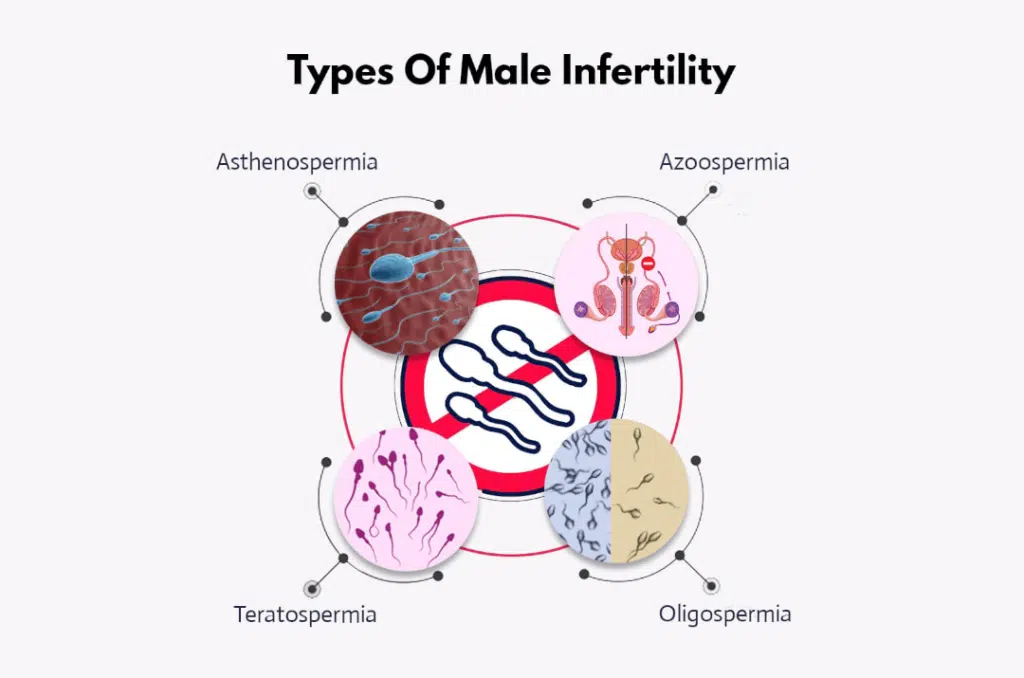Male infertility is a condition that affects the reproductive system and makes it hard for a man to have children. Thankfully, however, male infertility treatment in Turkey may be the solution that can please many men around the world and increase their odds of having children.
As new breakthroughs happen in science, the hope of millions of infertile couples goes high, especially those who’re searching for infertility treatments abroad.
Many couples suffer from infertility due to different causes. The treatment of male infertility may require a visit to the doctor and undergoing some tests to determine the cause of infertility. In most cases, male infertility is due to problems with sperm production or delivery of sperm to the egg.
What Is Male Infertility?
The process of reproduction depends on several factors. The man’s body makes small cells called sperm or spermatozoon. During sexual intercourse, ejaculation usually delivers sperm to the woman’s body. The man must be able to make healthy sperm and a good erection must occur for the sperm to reach the egg properly.
In general, male infertility is one of the problems that bothers the two couples. Despite frequent intercourse, they may still be unable to make babies, either because of low sperm production, sperm abnormality, or because of other reasons that cause male infertility.
Male Infertility Treatment in Turkey

In most cases, doctors cannot know the specific cause of infertility, but even if the cause is not clear, the doctor still can try several treatments and procedures that increase the chances of pregnancy. Male infertility treatment in Turkey is cheaper and widely available in different forms, most notably:
Surgery
In some cases, Turkish doctors can surgically correct the varicocele responsible for infertility. Also, the doctor can use sperm retrieval techniques in cases where there are no sperm in the ejaculated semen.
Varicocele surgery requires general or intravenous anesthesia. The pain after the surgery is usually mild, but recovery phases and follow-up needs vary among cases.
After repairing a varicocele, a healthcare provider should perform a physical exam to see if the large veins are completely disappeared. The veins often remain enlarged to some extent. Doctors should test semen every 3 months for at least a year or until pregnancy occurs.
Medications
Doctors often prescribe medications, such as antibiotics, to treat infections. These infections develop in the reproductive system. However, antibiotics cannot always restore fertility and Turkish doctors prescribe them only if needed.
Sexual Dysfunction Treatment
In some cases, erectile dysfunction or premature ejaculation may be the reason for infertility. Medications or consulting a medical professional can help solve these issues. Turkish pharmacies provide a lot of drug options to solve these problems.
Hormonal Therapies and Medications
Your doctor can suggest you take hormones or medications if your infertility is the result of high or low levels of certain hormones or problems with the way hormones work in your body.
Assisted Reproductive Technology (ART)
This refers to in vitro fertilization (IVF) and intracytoplasmic sperm injection (ICSI), which involve the insertion of sperm directly into the female reproductive tract. In vitro fertilization in Turkey include obtaining sperm either by natural ejaculation or by extracting them surgically.
Traditional Turkish Treatments
The use of folk medicine to treat infertility is very common in Turkey according to studies. You can easily purchase herbs and supplements that allegedly treat male infertility in Turkey. However, many of these herbs are still under investigation by scientists.
Cost of Male Infertility Treatment in Turkey
The cost of male infertility treatment in Turkey differs according to the kind of treatment that you’re seeking. In short, here are the most common types of treatment and their cost:
- IVF & ICSI procedures: Most people visit Turkey to receive IVF or ICSI procedures because of their affordable costs compared to other developed countries. According to a study, the average cost of IVF in Turkey is around 8,500 US dollars. In the united states, the cost of IVF can reach up to 12,000 US dollars.
- Varicocele surgery: Men who suffer from large veins in their testicles can easily solve this problem in Turkey. The cost of varicocele surgery in Turkey ranges between 400-600 US dollars only.
- Medications: The price of fertility medications in Turkey is exceptionally low compared to other countries. You can also get certain antibiotics over the counter.
Causes of Male Infertility

There are many things that can cause infertility in men and lead them to ask for male infertility treatment in Turkey. Both biological and environmental factors can affect male fertility. Common possible causes of male infertility are as follows:
Sperm Problems
- Inability to produce sperm cells.
- Production of low-quality sperm.
- Genetic diseases are also a cause of male infertility.
- Deformed sperm, which cannot live long enough to fertilize an egg.
- Other diseases, such as diabetes, some autoimmune disorders, cystic fibrosis, and infections.
- There are cases in which the veins of the testicles are larger than usual. This leads to a high temperature, which affects the shape and number of sperm.
- Some unhealthy habits may affect the sperm, such as drug abuse, drinking alcohol, and heavy smoking.
- Hormonal disorders can affect the pituitary gland, which may cause male infertility.
Anatomical Problems
Many structural anomalies can cause the reproductive system to stop producing semen. This may result from genetic or congenital defects. Sexually transmitted diseases can also lead to infections and semen blockage. Other causes include scar tissue resulting from surgery or swollen, twisted veins in the scrotum.
Other Factors
These factors include things like erectile dysfunction, premature ejaculation, liver or kidney diseases, and taking epilepsy medications.
Symptoms of Male Infertility
There are many symptoms that indicate male infertility, but the main sign of infertility is simply the inability to have children. Signs and symptoms that you might notice include:
- Problems in sexual functions. This refers to things like the difficulty of ejaculation or the ejaculation of small amounts of semen. You may also have low libido (sexual desire) and erectile dysfunction.
- Swelling or enlargements in the testicle (lumps), and a feeling of pain in this area.
- Abnormal breast growth, which is known as male gynecomastia.
- Lack of facial or body hair, or any other indications of chromosomal or hormonal abnormalities.
- Low sperm count, which happens when the sperm number is less than 15 million sperm per milliliter of semen or when the total number of sperm is less than 39 million per ejaculation.
In some cases, underlying diseases and problems lead to the appearance of several other signs and symptoms. These cases may have genetic disorders, large veins in the testicle, a hormonal imbalance, or some conditions that prevent the passage of sperm in the body. Nonetheless, male infertility treatment in Turkey can involve solutions to deal with these problems and improve their status.
Who Is at Risk of Infertility?

Males who have experienced the following things may be more likely to suffer from infertility:
- Previous prostatitis or previous genital infections.
- Injury or twisting (torsion) of the testicles.
- Early or late puberty.
- Exposure of the genitals to high temperatures.
- Hernia repair.
- Detached testicles.
Diagnosis of Male Infertility
Doctors must perform some tests to diagnose male infertility correctly but proving male infertility treatment in Turkey. There are several ways to diagnose this problem, including:
Physical Examination
The physical exam includes a complete examination of the reproductive organs. The doctor will ask you several questions to see if there is a genetic history of infertility or any health problems, injuries, or previous surgeries that can affect fertility. The doctor may also ask some questions about sexual habits in adulthood.
Semen Analysis
Your doctor may try to obtain a sample of your semen. You can provide the sample by masturbation or ejaculation into a special container in the clinic. Some prefer to collect semen by using a condom during intercourse. The doctor sends the semen to the laboratory to determine the number of sperm and search for any abnormalities. The laboratory will examine the semen to look for any other problems such as infections.
Scrotum Ultrasound
This test targets the scrotum and uses high-frequency sound waves to produce images inside your body. These waves help the doctor identify whether there is varicocele or other problems in the testicles and their supporting structures.
Transrectal Ultrasound
To perform this test, your doctor will insert a small tube into the rectum, so that they can examine the prostate and detect blockages in the tubes that carry semen.
Urinalysis After Ejaculation
Sperm in the urine can indicate that it has traveled backward into the bladder instead of exiting the penis during ejaculation. This is known as retrograde ejaculation.
Genetic Testing
Through a blood test, your doctor can detect changes in the “Y” chromosome, which indicates a genetic defect. The genetic test can diagnose syndromes, especially congenital or genetic syndromes.
Specialized Sperm Function Tests
Several tests can check how well sperm survive after ejaculation and how well they can penetrate or attach to the egg, but these tests are not widely common.
Male Infertility Prevention
You can avoid some of the common causes that contribute to male infertility, but it is not always possible to prevent male infertility. Prevention methods include the followings:
- Avoid alcohol or drug abuse.
- Maintain an ideal weight as much as possible.
- Avoid anxiety and tension.
- Avoid things that increase the temperature of the testicles.
- Stay away from pesticides.
- Avoid unhealthy ways to reach orgasm.
- Quit smoking.
The Bottom Line
Infertile men are starting to consider visiting Turkey to try different types of surgical and nonsurgical treatments for infertility. Male infertility treatment in Turkey can involve surgery, medications, supplements, and others. The cheap cost of treatment in the country is the driving force that leads many men to consider treatment in the country.
International Clinics provides high-quality services in accordance with international medical standards. An elite group of specialized doctors provides male infertility treatment in Turkey by using modern technologies. You can contact us for any inquiries. One of our specialists will answer all your questions quickly.
Frequently Asked Questions (FAQ)
What Is the Best Treatment for Infertility in Men?
The answer depends on the nature of the problem you have. For instance, if you have enlarged testicular veins, then surgery might be the right option for you, while if you have hormonal problems, certain drugs can be helpful instead of surgery.
What Is the Permanent Solution for Male Infertility?
In vitro fertilization (IVF) and intracytoplasmic sperm injection (ICSI) can bring remarkable results and end male infertility permanently in some cases.
What Is the Cost of IVF in Turkey?
The cost of in vitro fertilization (IVF) in Turkey is around 8000 US dollars.
Can Infertility in Man Be Cured?
Infertility in men can be cured, but this depends on the type of infertility that men have.
Which Sperm Is Best for Pregnancy?
The best sperm are the healthy sperm that can swim normally and have normal shape and number.
Is Turkey a Good Place for IVF?
Turkey is one of the safest places to get in vitro fertilization (IVF), thanks to the advanced technology and experience of its doctors.
How Long Is IVF in Turkey?
In vitro fertilization (IVF) does take around 2-4 weeks to be completed in Turkey, depending on the complexity of the procedure.
Which IVF Clinic Has the Highest Success Rate in Turkey?
International Clinics is known for their successful results, especially when it comes to in vitro fertilization (IVF) and reproductive surgery.
Read also: Glaucoma Treatment in Turkey


